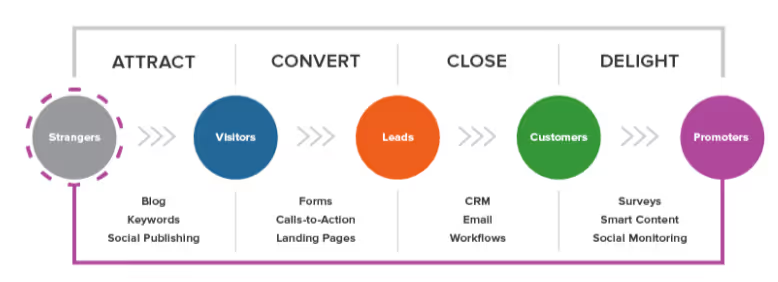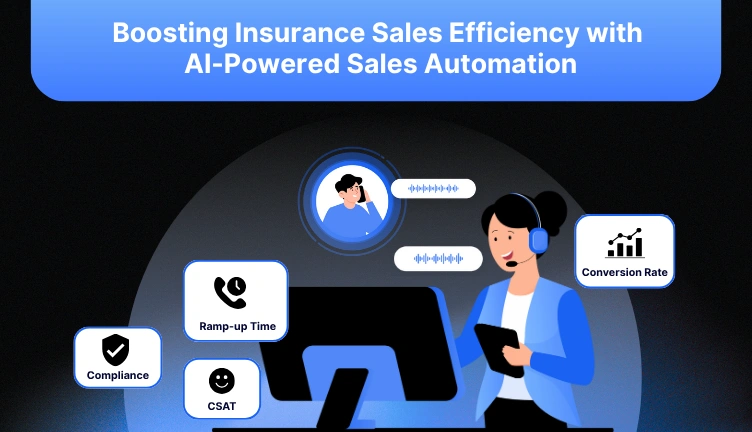Sales teams today face one persistent challenge: consistently filling the pipeline with qualified leads. With mounting pressure to generate more revenue, sales reps often need to catch up on time-consuming prospecting tasks. Sales Development Representatives (SDRs) fill this gap by managing the crucial lead qualification task, which helps close the gap between marketing and sales.
An SDR, or Sales Development Representative, is responsible for prospecting, qualifying leads, and ensuring only high-quality prospects are passed to account executives for closing. SDRs focus on the early stages of the sales funnel, making initial contact and nurturing leads until they are ready for the next stage of the sales process.
This blog will discuss what an SDR is in sales, the abilities needed for success, when to bring in an SDR team, and how SDRs can transform your sales process and propel business expansion.
Empower your SDRs with the latest AI technology for higher lead conversions.
What is the Role of an SDR in Sales?
SDR stands for Sales Development Representative, a specialized role within sales teams focusing on lead generation, qualification, and nurturing potential customers before passing them to account executives. SDRs typically engage with prospects at the top of the sales funnel, identifying key decision-makers and ensuring leads are prepped for conversion.
Responsibilities of Sales Development Reps (SDRs)
An SDR’s main job is to drive qualified leads into the pipeline. This involves:
- Researching prospects: SDRs are responsible for identifying potential clients who fit the ideal customer profile.
- Cold outreach: SDRs contact these leads to spark interest using emails, calls, and social media.
- Lead qualification: Through initial contact, they evaluate whether a prospect is a good fit, ensuring that only high-quality leads are passed to the sales team.
- Follow-up: SDRs regularly follow up with leads to nurture them until they are ready to purchase.
SDRs do not close deals themselves but play a critical role in ensuring the sales process runs smoothly by keeping the pipeline full and active.

How SDRs Support the Sales Pipeline and Lead Generation
SDRs focus on the top of the sales funnel (TOFU), where they engage potential leads before handing them off to sales executives. Their job ensures a steady stream of well-vetted leads, enabling account executives to focus on closing deals. The role of an SDR is essential to improving conversion rates and ensuring that the sales team works on high-value opportunities.
Why You Need an SDR Team for Sales Success
SDRs act as the first point of contact for most prospects, making them the face of your sales organization. But why are they so essential? One major reason is their ability to scale outreach efforts, ensuring no potential lead falls through the cracks.
In B2B sales, the ability to nurture relationships early on significantly increases the chances of closing a deal.
According to an article by Gartner, sales development teams bridge the gap between sales and marketing, achieving a high conversion rate of 30% from lead to opportunity.
SDRs are important in the sales team’s overall strategy because they efficiently manage time-consuming prospecting tasks. This frees up account executives to focus on building relationships and closing deals.
SDR vs. Account Executive: How Their Roles Differ
Though SDRs and account executives (AEs) contribute to sales, their roles differ significantly. SDRs focus on lead generation, while AEs concentrate on closing deals. A well-balanced sales team utilizes both roles to ensure a seamless process, from finding leads to sealing contracts. Without SDRs, AEs would spend more time on cold outreach, limiting the number of deals they could close.
In B2B sales, long sales cycles and high-value transactions make SDRs indispensable. SDRs bring value by continuously generating leads and maintaining a robust pipeline. With a steady stream of prospects, sales teams can operate more efficiently, increase revenue, and maintain consistent growth.
This blog is just the start.
Unlock the power of Convin’s AI with a live demo.

When Should You Hire an SDR Team?
If your sales team spends too much time on lead generation and needs more on closing deals, it might be time to hire an SDR team. This is especially important when scaling your business. As companies grow, they face the challenge of managing more leads. An SDR team helps divide the workload, ensuring that account executives can focus on converting high-quality leads.

Signs Your Sales Team Needs SDRs
Here are some clear signs your business needs SDRs:
- Your sales cycle should be shorter because account executives are bogged down with cold outreach.
- Qualified leads are slipping through the cracks due to a lack of consistent follow-up.
- Your revenue growth is stagnant because you’re not generating enough new opportunities.
If you see any signs, bringing in an SDR team can help streamline your sales process and improve efficiency.
Companies that hire SDRs often experience higher sales productivity and improved lead-to-close ratios. With SDRs focusing on nurturing leads, account executives can handle more deals, leading to faster revenue growth. As a result, many businesses that add SDRs to their team see a noticeable improvement in their overall sales performance.
Boost lead-to-prospect conversion rates with AI-driven insights for SDRs.
Must-Have Skills for Sales Development Reps
To succeed, SDRs need a specific skill set that allows them to identify, nurture, and qualify leads. Here are the essential skills every SDR must master:
- Communication skills: SDRs must be excellent communicators who can quickly engage prospects and convey value.
- Research skills: An SDR must be able to analyze industry data, competitor information, and customer profiles to identify the best prospects.
- Persistence: The ability to handle rejection and keep pushing forward is crucial to an SDR’s success.
- Time management: Juggling many leads requires strong organizational skills and the ability to prioritize effectively.
One of the most valuable skills for an SDR is communication. SDRs must connect with decision-makers and create interest in the company's offerings. This involves creating personalized messages that resonate with the target audience. A successful SDR must also know how to ask the right questions to identify pain points, making it easier for account executives to present solutions.
Persistence and CRM Mastery: A Winning Combo for SDRs
Handling rejection is part of the SDR job, making persistence a critical skill. Only some leads will convert immediately, and successful SDRs know how to keep the conversation going. Additionally, CRM mastery is vital for tracking interactions with prospects and ensuring consistent follow-ups, which increases the chances of eventual conversion.
Essential Tools Used by SDRs to Boost Performance
Sales Development Representatives (SDRs) need the right tools to streamline workflows and maximize efficiency to excel in their roles. By leveraging essential SDR tools like CRMs and automation platforms, SDRs can optimize their outreach, improve lead management, and ultimately boost sales performance.
- CRM Systems and SDR Tools for Streamlining Workflows
SDRs rely on Customer Relationship Management (CRM) systems to manage their leads and interactions. CRMs like Salesforce and HubSpot help SDRs track every conversation, ensuring every lead is remembered. These tools provide essential insights into prospect behavior, assisting SDRs to personalize their outreach and follow-up efforts.
- Prospecting Tools: How SDRs Identify and Engage Leads
SDRs use LinkedIn Sales Navigator, ZoomInfo, and Apollo.io to find new leads. These platforms allow SDRs to identify decision-makers and tailor their outreach efforts based on a prospect’s role, industry, or behavior.
- Automation Tools SDRs Use for Efficiency and Productivity
Automation tools help SDRs manage their outreach at scale. These platforms allow for automated follow-ups, ensuring no lead is neglected while enabling SDRs to reach more prospects in less time. Sales database software helps SDRs discover, enrich, and maintain accurate lead/contact records.
Using a combination of prospecting tools, CRM, and automation tools, SDRs can enhance their productivity and focus on generating qualified leads. Investing in the right technology ensures that SDRs meet and exceed their sales targets.
Optimizing SDR Performance with Convin's AI-Powered Tools
As sales teams rely more on Sales Development Representatives (SDRs) for lead generation, tools must be used to support their efficiency. Convin offers an AI-driven platform that optimizes SDRs' performance through conversation intelligence and real-time analysis.

Here’s how Convin enhances SDRs’ roles:
- Real-Time Guidance and Automated Coaching: Convin provides SDRs with instant feedback during calls, helping them improve their prospecting techniques and communication strategies on the spot.
- Speech-to-Text and Conversation Analysis: With advanced speech-to-text models, Convin transcribes SDR conversations, allowing for deeper insights and highlighting areas where SDRs can improve their outreach and follow-up efforts.
- Automated Quality Management: Every SDR interaction is monitored for compliance and effectiveness. This frees SDRs from worrying about quality checks and allows them to focus on driving leads into the sales pipeline.
- Personalized Coaching for Continuous Improvement: AI-driven coaching benefits SDRs by identifying performance gaps and offering tailored training recommendations.
By integrating Convin, SDRs can become more efficient and better equipped to qualify leads, boosting overall sales team productivity and pipeline growth.
See how Convin’s AI can streamline your SDR process and close more deals.
The Impact of SDRs on Sales Success
A well-equipped Sales Development Representative (SDR) team is essential for consistently generating high-quality leads and driving revenue growth. By focusing on lead generation and qualification, SDRs ensure that only the most promising prospects move through the pipeline, allowing sales teams to close more deals efficiently. SDRs can significantly enhance your overall sales performance, supported by the right tools and strategies.
Discover how to transform your sales process and boost your pipeline. Start building your SDR team today, and watch your lead-to-sale conversions soar. Get started by booking a demo!
Frequently Asked Questions
1. How do SDRs fit into the overall sales process?
SDRs focus on the top of the sales funnel, handling prospecting and qualifying leads before passing them to account executives. This helps streamline the sales process and ensures only qualified leads move forward.
2. What tools can help SDRs with cold outreach?
SDRs often use tools like LinkedIn Sales Navigator, ZoomInfo, and Outreach.io to efficiently identify prospects and manage their outreach. These tools help SDRs engage leads and improve response rates.
3. How can SDRs improve their lead qualification skills?
SDRs can improve lead qualification by asking the right questions, using AI tools like Convin to analyze conversations, and focusing on key pain points that align with the company's solution.
4. What’s the difference between SDRs and BDRs?
While both SDRs and BDRs focus on generating leads, SDRs typically work inbound leads, qualifying prospects from marketing efforts, whereas BDRs handle outbound prospecting.
5. How can AI tools help SDRs reduce lead response times?
AI-powered platforms like Convin offer real-time guidance and automated follow-ups, allowing SDRs to respond to leads faster and keep engagement levels high, improving overall conversion rates.




.avif)



.avif)